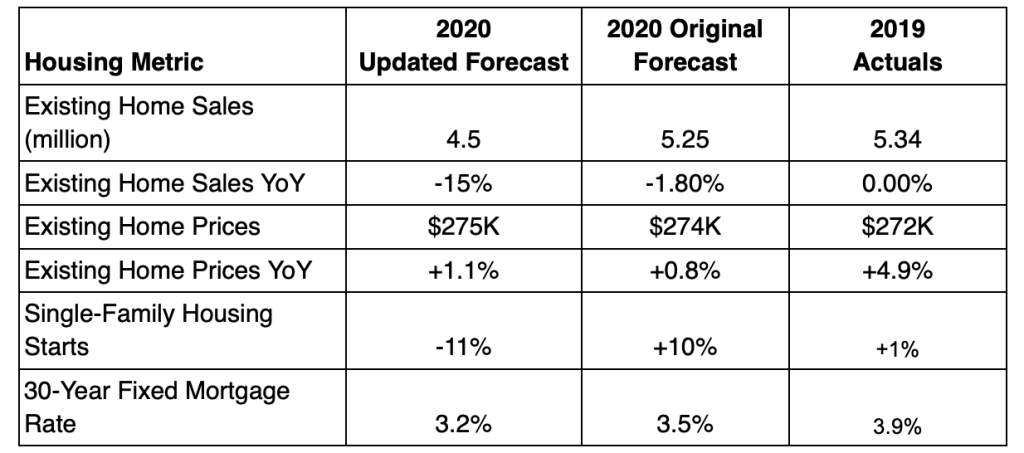Realtor.com now expects that home sales in the U.S. will rebound in the late summer and early fall as fears of the coronavirus begin to cool down, before experiencing a downturn again later in the year.
The real estate site released a new housing forecast Wednesday, which predicts that despite an uptick in transactions during the third quarter, largely from Millennials, home sales will be down 15% year over year.
According to the forecast, home prices will flatten nationally as demand shifts to secondary markets, where prospective buyers find more affordability and space.
The site also predicts that a second wave of coronavirus infections may happen later this year, driving home sales down even further during a time when home sales typically fall anyway.
“The path forward for home sales will resemble a W shape with homes sales rebounding in July, August, and September as fears of the coronavirus taper off and buyers return to the market to make up for the lost spring homebuying season before dipping again in the final months of the year as virus infections spike again and the lingering impact of the high unemployment rates are felt,” the real estate site said in a release.
The forecast also predicts that mortgage rates will drop to new record lows – below 3% – by the end of 2020.

“The U.S. housing market started 2020 with substantial momentum,” realtor.com Chief Economist Danielle Hale said. “With some of the best home sales and housing starts in more than a decade, our biggest challenge going into the spring home-buying season was a lack of for-sale homes. The coronavirus pandemic has kept both buyers and sellers on the sidelines, preserving market balance, for now. As cities and states begin the slow process of reopening, we’re going to see a see-saw recovery with ups and downs that will favor the nation’s secondary markets in the short-term.”
Home prices are projected to flatten, slightly increasing by 1.1% for the whole year, with small declines by the end of the year.
“The pandemic is leaving an imprint on the fabric of American life, culture, and preferences which we could see for years to come,” Hale continued. “After experiencing life under quarantine, many buyers are searching for affordability and greater space, which is driving demand out of the nation’s largest metros and into surrounding smaller towns.”
The realtor.com forecast predicts that housing inventory will remain low, as sellers are going to stay put and housing starts will decline.
In April, the number of new homes for sale was down 45% year over year. Despite this, home prices are expected to remain relatively stable, realtor.com said, so homebuyers will have less competition from all-cash investment buyers.
Drivers of the market vary by generation and location. Baby Boomers, who have notoriously stayed put in their homes, will most likely stay in place even longer.
It’s projected that Millennials will continue to dominate the market, according to the forecast. Millennials are slated to make up 50% of home purchases this year. That number could keep growing if older generations decide to take a step back from the market, realtor.com said.
Secondary markets will see more than normal demand as buyers continue to search for affordability and additional space. As these markets heat up, realtor.com says to expect to see a change to the mix of homes available for sale nationwide. As the mix of homes for sales shifts, the national listing price could decline to reflect the change towards more affordable homes.
The 2020 presidential election will continue to be a wild card for the housing market because historically, economic strength is a good predictor of how people will vote.
Speaking of economic strength, the global economy will also be important to watch this year. The U.S. is heavily dependent on imports and exports, which means if the global economy is struggling, the U.S. will feel that impact.



